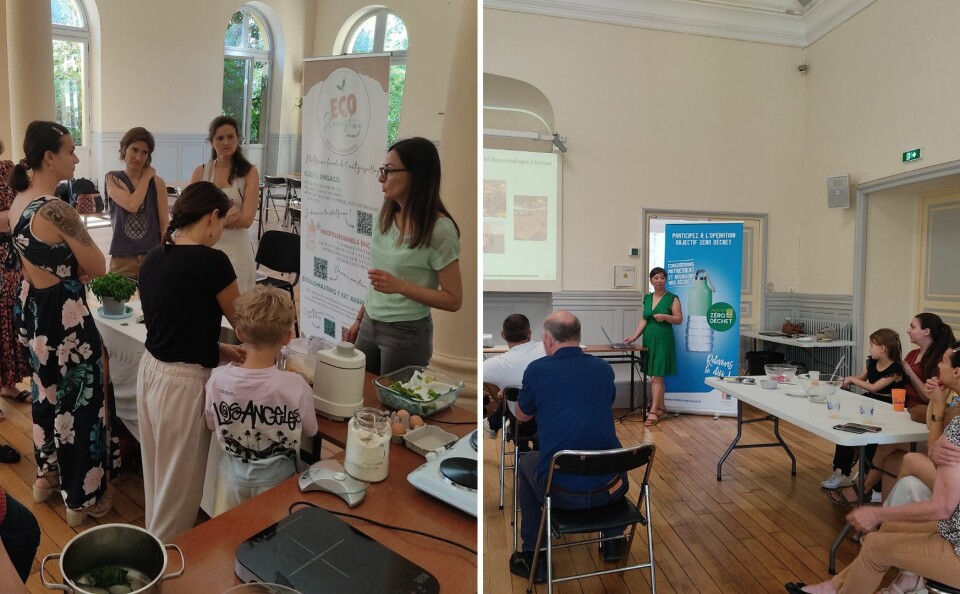-
Hydroelectric conversions boost demand for historic French watermills
Laws on restoring rivers mean many are now threatened with removal
-
Millions of Perrier bottles blocked in south of France over bacteria concerns
Anomalies found at plant in Gard
-
Local officials in south-west France search dumped bin bags to identify culprits
Around half of residents yet to collect access cards for new communal bins
Zero-waste workshops teach French towns to save money and the planet
Families reduced their household waste by 58% after using skills picked up at the events

More municipalities and intercommunal services around France are offering zero-waste workshops to help citizens decrease their waste consumption and raise awareness of environmental issues.
Such workshops – ranging from single events to long-term teamwork events – have been implemented in places such as Paris, Menton, Colmar and the whole of Corsica.
Zero-waste workshops take inspiration from an initiative by Richard Anthony, an American who founded an association to promote the works of university professor Paul Connett, who wrote The Zero Waste Solution as a new economic system that would transition from throwing to reusing.
Read more: Seven questions about new obligatory composting law in France
Homemade cleaning products and cooking techniques
The Connexion went to the final meeting of a group of families in Menton (Côte d’Azur) who followed a nine-month long zero-waste programme led by the Communauté de la Riviera Française (CRF), an intercommunal structure comprised of 15 communes in southern France.
“I learned how to produce my own household cleaning products, something I never thought possible,” said Julia Cataneso, a 40-year-old teacher and one of the participants.
The household cleaning product session was one of nine workshops spread out over nine months by the CRF.
The last workshop was centred around cooking techniques to include parts of vegetables or fruits that are often binned.
The families learned how to prepare ravioli, reusing radish tops in a base recipe composed of basil leaves and ricotta.
The families reduced overall waste by 39%
This final workshop of the season also gave families the opportunity to evaluate themselves after their nine-month effort in reducing waste, the CRF having asked them to monitor their overall consumption.
It turns out the figures compiled by the organisation showed important changes in all categories.
The families reduced their overall waste by 39%, packaging waste by 16% and household waste by 58%.
Likewise, the yellow bin – suitable for plastic and paper waste – was reduced from 1.92 litres to 1.61 litres, while the black bin – all sorts of waste – shrank from 2.27 litres to 0.95 litres per person per day.
Each person consumes 2.27 litres of household waste on average, according to figures from the Ademe, the government agency in charge of ecological transition.
Read more: France launches cash aid for people to repair clothes
More cities and companies running workshops
The Menton scheme was the third edition of the waste programme organised by the CRF after two prior editions in Sospel and La Turbie, two nearby towns in Alpes-Maritimes.
The fourth edition will take place in Beausoleil from February 3 to June 29.
“Our goal is to look out for people who are not yet aware of our cause and its benefits,” said Erika Tofani, responsible for the waste programme at CRF.
It is not just Menton which jumped on the zero-waste train. Paris launched its own first edition of ‘Le Pari(s) du Zéro déchet’, a play-on-words with Paris and ‘pari’ (bet) last May 24. Many cities and companies have followed suit.
The workshop pretty much revolved around the same workshops, from learning to produce homemade washing powder products to workshops which raise awareness on clothing manufacturing and ocean pollution.
A little time and effort can save money
“People are looking for simple and concrete solutions to reduce their global waste,” said Joséphine Dabilly, founder of the company Ateliers Zéro Déchet. Her company organises waste workshops for intercommunal structures and companies.
Ms Dabilly – who made waste management a lifestyle at home – said it takes little time and effort and saves a good chunk of money.
She shot several two-minute tutorial videos that are broadcast on France Télévisions and Youtube.
Each French person consumed 354 kilos of household waste in 2019, according to Ademe, a figure jumping to 536 kilos when communal waste is added and 1,800 kilos when professional waste (agriculture, hospital and industrial waste) is included.
It would need nine planets to live according to the consumption standards of Qataris, 8.2 planets for Luxembourgers and 5.2 for people from Bahrain, the three countries with the highest consumption according to Earth Overshoot Day for the calculated calendar date on which humanity’s resource consumption for the year exceeds Earth’s capacity.
The United Kingdom consumes 2.6 planets, France 2.8 and the United States 5.1 planets.
Related articles
Do not put biodegradable plastic bags with compost in France
























